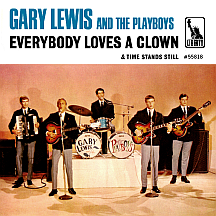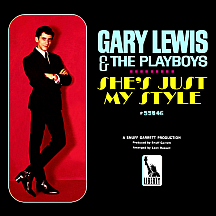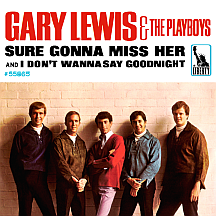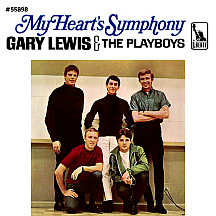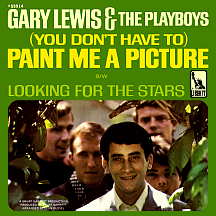GARY LEWIS AND
THE PLAYBOYS
Show business kids marked a music-making mini-trend in the mid-'60s. Nancy Sinatra (daughter of Frank) became a major star while Dino, Desi and Billy (with Dean Martin, Jr. and Desi Arnaz, Jr. making up two-thirds of the trio) scored a few hits of their own. Doris Day's son, Terry Melcher, found success with The Rip Chords and duo Bruce and Terry; Chris Crosby (son of Bob and nephew of Bing) had one minor hit. Still more Hollywood offspring, Melinda Marx (Groucho's daughter) and Tony Sales and the Tigers (led by Soupy Sales' sons Tony and Hunt), had less to show for their efforts.
In similar fashion, drummer and reluctant singer Gary Levitch followed in his father's footsteps, though not as a comic actor or comedian, the talents Joe Levitch (known far and wide as Jerry Lewis) had built his career on. The elder Lewis had done his share of singing (his nostalgic remake of Al Jolson's 1918 smash "Rock-A-Bye Your Baby With a Dixie Melody" had been a top ten hit in 1956) and young Gary Lewis followed a similar musical direction influenced by the rock and roll of his childhood; he started a band in 1963 when he was 17 and began performing publicly the following year, downplaying his one big celebrity connection, determined to make it without any assistance from his family.
Gary had made brief appearances in a few of his dad's movies (Rock-A-Bye Baby in '57, It's Only Money, The Nutty Professor and The Patsy between '62 and '64) but wasn't comfortable doing so. In the months prior to The Beatles' early-'64 impact, he and four of his friends got together as Gary and the Playboys (inadvertently using a name already established by a popular Baton Rouge, Louisiana band led by John Fred). Rhythm guitarist Dave Walker was the original lead singer despite the group's name, though much of the time they played rock instrumentals. David Costell was the lead guitarist, Al Ramsay the bassist and John West played the cordovox (an accordion-like non-squeeze electric instrument bearing the Gibson name). Gary stayed in the back with his drum kit, shying away from any Ringo-like spotlight-grabbing...but it just wasn't meant to stay that way.
They auditioned at Disneyland in Anaheim as any unknown group might and were hired to perform at the Space Bar (a not-so-futuristic snack bar) in the park's Tomorrowland section; their set consisted of hit cover tunes and instrumental jams during a several-week stint in the summer of 1964. Snuff Garrett of Liberty Records became aware of them and suddenly Gary's efforts to fly beneath the radar were squelched. The label signed the band on the condition that he would sing (a prospect he wasn't keen on) and the act would be renamed Gary Lewis and the Playboys. His mother, Patti Palmer Lewis, managed the group. The connection to his movie star dad would at some point be made obvious.
The band's earliest recordings were instrumentals ("Hard to Find" and "Tijuana Wedding" were on different flip sides of the first single). Garrett was determined to make a singer of Gary, double-tracking his voice and using whatever effects were needed to make him sound passable. "This Diamond Ring," written by Al Kooper, Bob Brass and Irwin Levine, had already been recorded by Florida-born soul singer Sammy Ambrose; Garrett and arranger Leon Russell made a slick pop production of the song using experienced session musicians, though the Playboys also played on the track. Then the group headed to New York for an appearance on the December 6, 1964 installment of The Ed Sullivan Show. With "Gary and the Playboys" clearly visible on the drum kit (it was changed soon afterwards), millions of viewers instantly became aware of the youthful quintet. After some reluctance on the part of Los Angeles top 40 stations to play the record, "This Diamond Ring" caught on in radio markets across America during the latter half of January; rising quickly on the charts, it spent two weeks at number one in February.
Following such an unexpected home run was tricky. Lewis and the Playboys had some creative input, but it was producer Garrett who called all the shots. Leon Russell (who, as Russell Bridges, had made some unreleased rock recordings for Chess Records in 1959 and played on many early '60s sessions in Los Angeles) arranged all of the group's early efforts and played a variety of keyboard instruments (piano, organ, harpsichord) long before his emergence as a popular solo artist in the '70s. Ron Hicklin and studio group The Eligibles served as Gary's backing singers on many of his recordings.
Glen D. Hardin (a pianist and member of The Shindogs, the house band for the ABC-TV series Shindig!) composed the group's second single, a number two hit. During the second week in May, British Invasion acts came close to a complete takeover of the U.S. top ten; Lewis's "Count Me In" was the only American representative among U.K. acts Herman's Hermits (two songs including "Mrs. Brown You've Got a Lovely Daughter" at number one), The Beatles, Wayne Fontana and the Mindbenders, The Seekers, Petula Clark, Freddie and the Dreamers, The Rolling Stones and instrumental studio group Sounds Orchestral. Gary and the guys performed the song in June on the 90 minute CBS-TV special It's What's Happening, Baby!, which featured nearly two dozen top-selling music acts and was hosted by New York disc jockey Murray the K.
"Little Miss Go-Go" (the flip side of "Count Me In") featured backing vocals by Steve Barri and P.F. Sloan of The Fantastic Baggys (best known for 1964's "Tell 'Em I'm Surfin'"); the song was also featured (with "This Diamond Ring") on the flip side of the blatantly commercial "Doin' the Flake," a mail order record advertised on boxes of Kellogg's Corn Flakes. The band was visible in theaters during the summer of '65; they performed "Little Miss Go-Go" in the Jerry Lewis comedy The Family Jewels and appeared in A Swingin' Summer backing soon-to-be superstar Raquel Welch, who sang "I'm Ready to Groove," though they didn't actually play on the track.
Hits seemed to come with little effort. "Save Your Heart For Me," a Gary Geld-Peter Udell song first recorded by Brian Hyland as a 1963 B side was well suited to Gary Lewis's limited vocal ability (which improved noticeably as time went by) and, as with the previous single, it reached number two on the charts. From the start, Gary had been composing songs with Russell and Thomas Lesslie; "Everybody Loves a Clown" was their first collaboration chosen as a single and the fourth top ten hit in a nine month span. "Time Stands Still," on the flip, is an oddity featuring Gary doing a tongue-in-cheek imitation of Jerry Lewis; he didn't expect the recording to be released but, as it turned out, his dad loved it.
At the label's insistence, Gary took front and center in his role as lead singer, leaving drumming duties to new group member Jim Keltner. Bassist Al Ramsay joined the Air Force around this time and was replaced by Carl Radle (later a member of Derek and the Dominoes with Eric Clapton). The band kicked off 1966 in the top ten with "She's Just My Style" (a Lewis-Russell-Lesslie-Al Capps composition) and two more top tens followed: Bobby Russell's "Sure Gonna Miss Her" (featuring flamenco-style guitar work by prolific L.A. studio musician Tom Tedesco) and "Green Grass" (penned by Roger Greenaway and Roger Cook who, singing under the illogical aliases David and Jonathan, had just made the top 20 with a song they didn't write: The Beatles' Rubber Soul album track "Michelle"). Dave Pell produced this one Playboys single.
With contributions from a number of songwriters, Lewis and the Playboys followed their seven top ten hits in a row (a rare feat) with "My Heart's Symphony" (Hardin wrote it) and "(You Don't Have To) Paint Me a Picture" (penned by Roger Tillison, Russell and Garrett), both solid top 20 hits. The group appeared in the film Out of Sight (with The Knickerbockers, The Astronauts, The Turtles, Dobie Gray, Freddie and the Dreamers and others) singing "Malibu Run," a track produced by Nick Venet (best known for producing The Beach Boys' early Capitol recordings) and released on the film's Decca Records soundtrack album. Gary and the Playboys also recorded the theme from the fall '66 Jerry Lewis film Way...Way Out, unreleased but pressed as an unnumbered promotional single.
In October and November the group piled onto Dick Clark's bus, joining the Caravan of Stars tour with Hyland, The Yardbirds, Sam the Sham and the Pharaohs, Bobby Hebb and Jimmy Clanton. Soon after, Gary's life took an about-face; in December he received his Army draft notice. Inspired by Elvis Presley's tour of duty between 1958 and '60, rather than seek a way out, he reported for two years' duty in January '67. Ballad "Where Will the Words Come From" (written by Hardin and Crickets guitarist Sonny Curtis) was moving into the top 40 at the time. Leon Russell, having built a solid track record, began to take a less hands-on role; various arrangers (among them Nick DeCaro, Jack Nitzsche and Al Capps) took his place over the next year.
During his first year in uniform, Gary continued making records when on leave. Many fine (if less successful) singles came out during 1967 including "The Loser (With a Broken Heart)" (written by Russell with Don Nix, former saxophonist for The Mar-Keys), the first hit without double-tracking on Gary's vocals. "Girls in Love" and "Jill" came from the creative songwriting team of Alan Gordon and Gary Bonner, who had written many of the Turtles' hits; production by Charles Koppelman and Don Rubin (on the former) and Gary Klein (on the latter) gave these tracks a noticeably Turtlesque pop-psych sound. For his last session before being sent overseas, Gary recorded several quickly-slapped-together oldies remakes, of which Hyland's '62 hit "Sealed With a Kiss" (an anemic vocal performance that, according to Gary, made him cringe when he later heard it on the radio) marked a return to the top 20 in August 1968. In the spring of '69, a rehash of The Cascades' 1963 smash "Rhythm of the Rain" became the final Gary Lewis and the Playboys record to hit the charts.
At the height of the Vietnam war in 1968, Gary Lewis spent the better part of a year in Korea. After his discharge he attempted to resume his career with the band, but they couldn't seem to position themselves in the harder rock and bubblegum environment of the era. Liberty passed on renewing his contract in 1970 and the group broke up. Gary ran his own music store in the San Fernando Valley for about 15 years starting in 1971, making solo records on a couple of occasions ("Peace of Mind" for Scepter in 1972 and "One Good Woman" for Epic in 1975). In the mid-1980s he formed a new group of Playboys and has been making the rounds ever since, appearing in concert with a number of his '60s contemporaries and enjoying every minute of it.
NOTABLE SINGLES:
- This Diamond Ring /
Hard to Find - 1965 - Count Me In /
Little Miss Go-Go - 1965 - Save Your Heart For Me - 1965
- Everybody Loves a Clown /
Time Stands Still - 1965 - She's Just My Style - 1966
- Sure Gonna Miss Her - 1966
- Green Grass - 1966
- My Heart's Symphony - 1966
- (You Don't Have To) Paint Me a Picture - 1966
- Where Will the Words Come From - 1966
- The Loser (With a Broken Heart) /
Ice Melts in the Sun - 1967 - Girls in Love - 1967
- Jill - 1967
- Sealed With a Kiss - 1968
- Main Street - 1968
- Rhythm of the Rain - 1969
- Peace of Mind - 1972
by Gary Lewis - One Good Woman - 1975
by Gary Lewis


